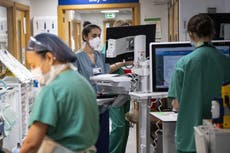Childhood obesity rates fall but top doctor sounds alarm on ‘disturbing’ rise in underweight pupils
‘Shocking divide’ between poorest and richest children on obesity rates yet to be tackled
Obesity rates among children have fallen for the second year in a row but a top doctor has sounded the alarm over a “horrifying” rise in underweight pupils.
Some 16 per cent of primary school children – 190,865 of the 1.18m surveyed – were considered to be obese or overweight in 2022-23, with 34,766 severely obese, according to NHS figures published Thursday. That was down from 17 per cent on the year before after soaring to a record high during the pandemic.
However, experts warned the figures were still too high and called on the government to clamp down on food companies through taxes such as the 2018 sugar levy on soft drinks.
But while obesity levels fell, the number of underweight children rose to 1.6 per cent last year – 9,584 children in the sample – compared to 1.5 per cent the previous year.
Dr Mike McKean, vice president for policy at the Royal College of Paediatrics and Child Health said he was “deeply disturbed to see a small, but notable rise in children starting secondary school underweight”.
“This is a horrifying, yet maybe not all too surprising development. After all, food insecurity is a regular occurrence for low-income households in the UK, with one in four households with children affected. Food banks are overwhelmed with the level of demand and teachers regularly tell us that they see children coming into school hungry,” he said.
The figures come after The Independent reported warnings from Boris Johnson’s former food tsar over the government’s failure to tackle obesity through measures such as a junk food tax.
Henry Dimbleby, a celebrity chef and founder of the Leon restaurant chain, said warned the government would be “crippled” by the obesity crisis in 10 years time and called on the prime minister to do more to tackle the issue.
It comes after research from BioMed Central in 2021 showed that obesity now accounts for more deaths in England and Scotland than smoking among people in middle and old age.
The National Obesity Alliance, representing medical royal colleges and charities, welcomed the decrease in obesity rates but warned more children are still leaving school at an unhealthy weight.
The latest data, published by NHS Digital on Thursday, shows gaps in obesity rates are much higher in poorer areas than the richest, with 12 per cent of children in deprived areas obese compared to 5.8 per cent in affluent areas. For those in Year 6, the gap was 30 per cent and 13 per cent.
It said: “These new figures show a shocking divide remains between the haves and the have-nots, and reflect a period during which the government failed to enact their own obesity strategy, instead leaving children exposed to manipulative advertising and an unhealthy food environment.”
“Voters want the healthy choice to be the easy choice and we know what works; financially incentivising companies to put healthier products on the shelves, through measures such as the Soft Drinks Industry Levy, and stopping children being bombarded with manipulative advertising. If the government brings in these plans, it will have a disproportional benefit on those struggling to get by; freeing from the harm caused by unhealthy food and drink.”
David Fothergill, chairman of the Local Government Association’s Community Wellbeing Board said it was encouraged by the fall in obesity but said there were still areas of concern.
“Children living in the most deprived areas are more than twice as likely to be living with obesity than children in the least deprived areas and there’s an alarming increase in year six pupils who are underweight. The public health grant which goes to fund these vital support services has been reduced by over £1 billion since 2015.
“Councils need to see a longer-term increase in this to allow them to invest in services, which will help to further cut rates of childhood obesity and improve health outcomes in all local communities.”
Join our commenting forum
Join thought-provoking conversations, follow other Independent readers and see their replies
Comments

Bookmark popover
Removed from bookmarks